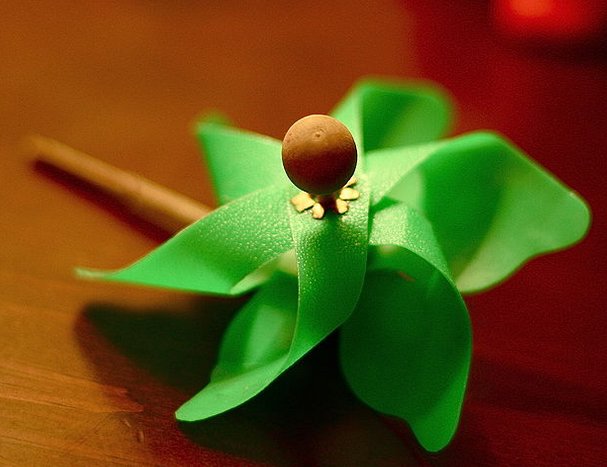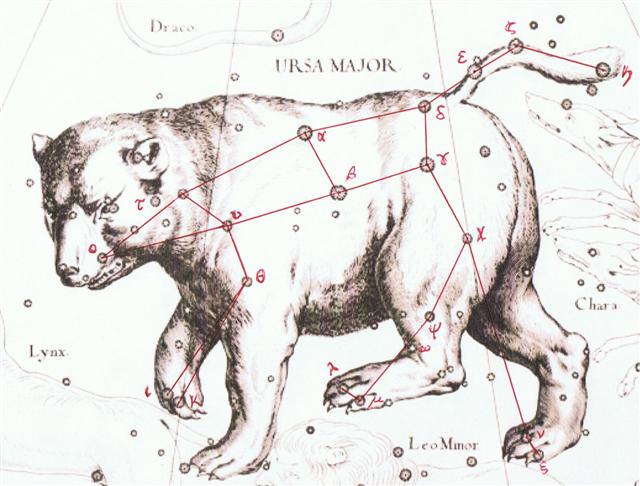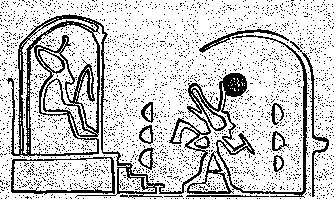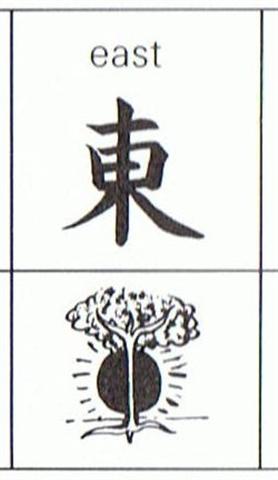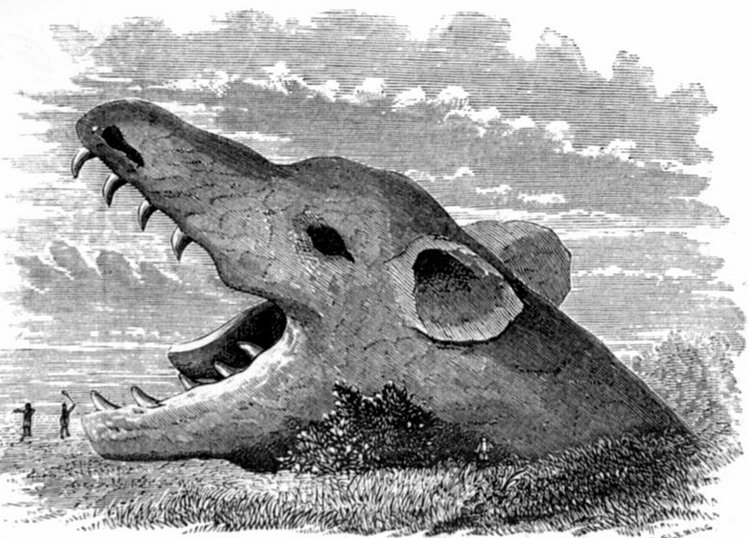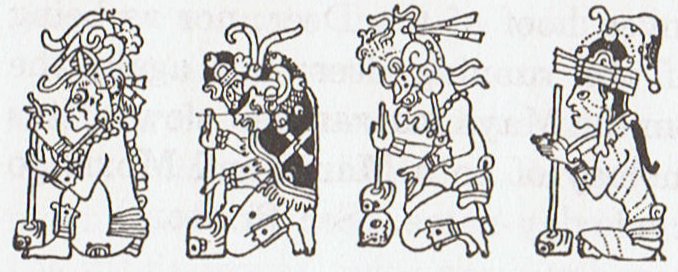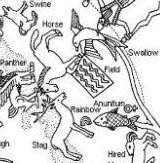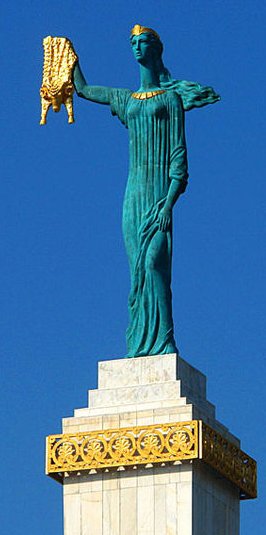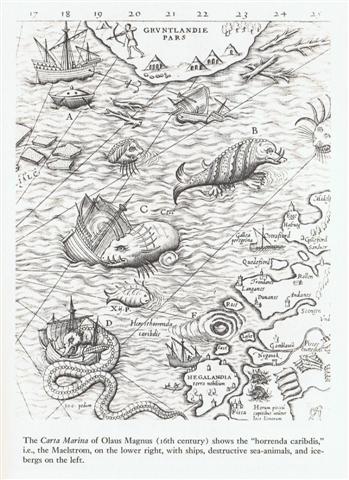221. Ilmarinen had 4 winds who helped him: Called the winds to work the bellows // To the utmost of their power. // Then the winds arose in fury, // Blew the east wind, blew the west wind, // And the south wind yet more strongly, // And the north winds howled and blustered. Already at the beginning of Manuscript E, on the other hand, it was clarified that for creating Easter Island (outside the equatorial belt down in the south) there were 10 helpers:
Matagi is the normal Polynesian word for Wind, but on Easter Island it was not unusual to change the vowel (liquid) a to the liquid (vowel) o. Such a change could have been an indication of special meaning, for instance referring to the distant past. The 4 winds which helped Ilmarinen were E, W, S, and N, in that order. The first was E and the last N. The rising Sun was in the East (at the winter solstice so to say) and therefore the last corner (4) was in the North. A new Sun had to be generated in the north. The unlucky 4 (Saturn) therefore also implied a new beginning. ... Interestingly, since another meaning of shi is 'death', the number 4 is considered unlucky. For example, the floor numbering in hotels sometimes jumps mysteriously from 3 to 5; it is also considered unlucky to give four of something as a present ... Evidently the winds of change (from one season to the next) had a special case, viz. where a sudden jump had to be done from the current position of the Sun to his beginning. This was accomplished by the Whirlwind which blew from the (present) front side to the Whirlpool at the back side.
... Väinömöinen, ancient of days and wise among the wise, has recourse to an unworthy trick. He lures the smith with a story of a tall pine, which, he says, it growing Near where Osmo's field is bordered. // On the crown the moon is shining. // In the boughs the Bear is resting. Ilmarinen does not believe him; they both go there, to the edge of Osmo's field, Then the smith his steps arrested, // In amazement at the pine-tree, // With the Great Bear in the branches, // And the moon upon its summit. Ilmarinen promptly climbs up the tree to grasp the stars. Then the aged Väinömöinen, // Lifted up his voice in singing: // 'Awake, oh Wind, oh Whirlwind // Rage with great rage, oh heavens, // Within thy boat, wind, place him // Within thy ship, oh east wind // With all thy swiftness sweep him // To Pohjola the gloomy. Then the smith, e'en Ilmarinen // Journeyed forth, and hurried onwards, // On the tempest forth he floated, // On the pathway of the breezes, // Over moon, and under sunray. // On the shoulders of the Great Bear // Till he reached the halls of Pohja, // Baths of Sariola the gloomy. In this utterly unintended manner, Ilmarinen lands in Pohjola, and not even the dogs are barking ... I guess glyph number 384 (= 364 + 20 = 378 + 6) was meant to illustrate this kind of swift journey to the back side. This was a cardinal point: ... The Moon was visible for 29 nights, and then her back side (●) was bathed in the vitalizing rays from Tane, making her grow (tupu) once again ... ... When the new moon appeared women assembled and bewailed those who had died since the last one, uttering the following lament: 'Alas! O moon! Thou has returned to life, but our departed beloved ones have not. Thou has bathed in the waiora a Tane, and had thy life renewed, but there is no fount to restore life to our departed ones. Alas ...
The uplifted pair of semicircles at left in glyph number 383 are like the 3 'buns' to the left of the Palace Chapel in ancient Egypt (see below). But on the right side of the central void the sign is different - there are 7 'fire feathers' and the top 3 of them are 'encapsulated'. The 3 Egyptian buns oriented in the forward direction are inside the Chapel and not visible, they are also encapsulated. ... The king, wearing now a short, stiff archaic mantle, walks in a grave and stately manner to the sanctuary of the wolf-god Upwaut, the 'Opener of the Way', where he anoints the sacred standard and, preceded by this, marches to the palace chapel, into which he disappears. A period of time elapses during which the pharaoh is no longer manifest.
When he reappears he is clothed as in the Narmer palette, wearing the kilt with Hathor belt and bull's tail attatched. In his right hand he holds the flail scepter and in his left, instead of the usual crook of the Good Shepherd, an object resembling a small scroll, called the Will, the House Document, or Secret of the Two Partners, which he exhibits in triumph, proclaiming to all in attendance that it was given him by his dead father Osiris, in the presence of the earth-god Geb. 'I have run', he cries, 'holding the Secret of the Two Partners, the Will that my father has given me before Geb. I have passed through the land and touched the four sides of it. I traverse it as I desire.' ... At first the Pharaoh went to the Sanctuary of the Wolf God - the Opener of the Way (Upwaut) - and then he went into his Palace Chapel, where he disappeared from sight for some time. In the C text the corresponding period of invisibility could have begun 8 days (corresponding to the period Venus was absent from the night sky) before the beginning of side b (where Metoro said E tupu ki roto).
However, 393 - 375 = 18 (= 10 + 8 = 364 - 354 + 8) and there was also a difference of 10 days from the day Hotu A Matua landed on Easter Island to the day the Explorers (the planets) left the island for their return voyage: ... The Explorers left Easter Island for their journey home 10 days after Hotu had arrived. I.e. they had stayed on Easter Island from "June 1 (152) to "October 25 (298) = 146 days. Counting from their departure from Hiva to their departure from Easter Island gives as a result the significant number 183 (= 366 / 2 = 298 - 115) ... Ilmarinen needed 4 wind helpers and 364 - 360 (= 12 * 30) = 4, which seems to indicate 10 wind helpers (ariki motongi) were needed to cover the distance 364 - 354 (= 12 * 29½). The position of the Sanctuary of the Wolf God could have been defined from *Ca14-14 (where 14 * 14 = 196 = 392 / 2). The glyph resembles *Ca14-23 and in Japan (the Land of the Rising Sun) they wrote the direction East as a kind of Tree with rays behind:
... Usually explained incorrectly as sun rising behind trees to indicate dawn and thus east, an error of many centuries' standing. Very old forms reveal that is is a tied sack with a pole thrust through to facilitate carrying, and in that regard it is in the same group as bundle and select / open bundle ... The error seems to stem from a reasonably early form in which the ends of the binding have become separated from the sack, thus suggesting the early form of tree / wood. It is not clear whether this is a simple copying error, an attempt to refer to the wooden nature of the pole, or a mistaken interpretation of the elements as sun and tree. In any event, from an early stage [it] was borrowed phonetically to express east. Some scholars feel that it also lent an idea of thrusting through (i.e. the pole through the binding) and thus by extension suggested the sun thrusting up through the horizon, giving dawn and hence east ...
The Whirlwind was the appropriate kind of transportation because it resembled the circular motion high up in the immortal north, where fire should be created by friction in the way only a female character could do in the final quarter:
The first creation down at the bottom of the furnace was the Bow for creating Fire: On the first day of their labour // He himself, smith Ilmarinen, // Stooped him down, intently gazing, // To the bottom of the furnace, // If perchance amid the fire // Something brilliant had developed. From the flames there rose a crossbow, // Golden bow from out the furnace; // 'Twas a gold bow tipped with silver, // And the shaft shone bright with copper. And the bow was fair to gaze on, // But of evil disposition // And a head each day demanded, // And on feast-days two demanded, // He himself, smith Ilmarinen, // Was not much delighted with it, // So he broke the bow to pieces, // Cast it back into the furnace. Anciently the northern spring equinox had been at the Stag, at the Rainbow, and at Anunitum (where Regulus culminated):
... A man had a daughter who possessed a wonderful bow and arrow, with which she was able to bring down everything she wanted. But she was lazy and was constantly sleeping. At this her father was angry and said: 'Do not be always sleeping, but take thy bow and shoot at the navel of the ocean, so that we may get fire.' The navel of the ocean was a vast whirlpool in which sticks for making fire by friction were drifting about. At that time men were still without fire. Now the maiden seized her bow, shot into the navel of the ocean, and the material for fire-rubbing sprang ashore. Then the old man was glad. He kindled a large fire, and as he wanted to keep it to himself, he built a house with a door which snapped up and down like jaws and killed everybody that wanted to get in. But the people knew that he was in possession of fire, and the stag determined to steal it for them. He took resinous wood, split it and stuck the splinters in his hair. Then he lashed two boats together, covered them with planks, danced and sang on them, and so he came to the old man's house. He sang: 'O, I go and will fetch the fire.' The old man's daughter heard him singing, and said to her father: 'O, let the stranger come into the house; he sings and dances so beautifully.' The stag landed and drew near the door, singing and dancing, and at the same time sprang to the door and made as if he wanted to enter the house. Then the door snapped to, without however touching him. But while it was again opening, he sprang quickly into the house. Here he seated himself at the fire, as if he wanted to dry himself, and continued singing. At the same time he let his head bend forward over the fire, so that he became quite sooty, and at last the splinters in his hair took fire. Then he sprang out, ran off and brought the fire to the people ...
... Dante kept to the tradition of the whirlpool as a significant end for great figures, even if here it comes ordained by Providence. Ulysses has sailed in his 'mad venture' beyond the limits of the world, and once he has crossed the ocean he sees a mountain looming far away, 'hazy with the distance, and so high I had never seen any.' It is the Mount of Purgatory, forbidden to mortals. 'We rejoiced, and soon it turned to tears, for from the new land a whirl was born, which smote our ship from the side. Three times it caused it to revolve with all the waters, on the forth to lift is stern on high, and the prow to go down, as Someone willed, until the sea had closed over us.' The 'many thoughted' Ulysses is on his way to immortality, even if it has to be Hell. The engulfing whirlpool belongs to the stock-in-trade of ancient fable. It appears in the Odyssey as Charybdis in the straits of Messina - and again, in other cultures, in the Indian Ocean and in the Pacific. It is found there too, curiously enough, with the overhanging fig tree to whose boughs the hero can cling as the ship goes down, whether it be Satyavrata in India, or Kae in Tonga ... ... The Symplegades ... or Clashing Rocks, also known as the Cyanean Rocks, were, according to Greek mythology, a pair of rocks at the Bosphorus that clashed together randomly. They were defeated by Jason and the Argonauts, who would have been lost and killed by the rocks except for Phineus' advice. Jason let a dove fly between the rocks; it lost only its tail feathers. The Argonauts rowed mightily to get through and lost only part of the stern ornament. After that, the Symplegades stopped moving permanently ... The Argonauts, with the Golden Fleece on board, had to pass the Symplegades, the clashing rocks. Once a ship with its crew came through unharmed - so the 'blessed ones' (makaroi) had decided long ago - the Symplegades would stay fixed, and be clashing rocks no longer. After that 'accepting the novel laws of the fixed earth', they should 'offer an easy passage to all ships, once thay had learnt defeat'. This is only one station on the long 'opening travel' of the Argonauts transporting the Golden Fleece (of a ram), undertaken in all probability to introduce the Age of Aries, but it demonstrates best the relevant point, namely, 'the novel laws' ...
... The Euripus, which has already come up in the Phaedo, was really a channel between Euboea and the mainland, in which the conflict of the tides reverses the current as much as seven times a day, with ensuing dangerous eddies - actually a case of standing waves rather than a true whirl. We meet the name again at a rather unexpected place, in the Roman circus or hippodrome, as we know from J. Laurentius Lydus (De Mensibus I.12), who states that the center of the circus was called Euripos; that in the middle of the stadium was a pyramid, belonging to the Sun; that by the Sun's pyramid were three altars, of Saturn, Jupiter, Mars, and below the pyramid, altars of Venus, Mercury, and the Moon, and that there were not more than seven circuits (kykloi) around the pyramid, because the planets were only seven. (See also F. M. Cornford's chapter on the origin of the Olympic games in J. Harrison's Themis (1962), p. 228; G. Higgins' Anacalypsis (1927), vol. 2., pp. 372ff.) This brings to mind (although not called Euripus, obviously, but 'the god's place of skulls') the Central American Ball Court which had a round hole in its center, termed by Tezozomoc 'the enigmatic significance of the ball court', and from this hole a lake spread out before Uitzilopochtli was born. See W. Krickeberg, 'Der mittelamerikanische Ballspielplatz und seine religiöse Symoblik', Paideuma 3 (1948), pp. 135ff., 155, 162. And here the unstable Euripus of the Ocean, which flows back to the beginnings of its mysterious source, dragged with irresistible force the unhappy sailors, thinking by now only of death, towards Chaos. This is said to be the maw of the abyss, that unknown depth in which, it is understood, the ebb and flow of the whole sea is absorbed and then thrown up again, which is the cause of the tides. This is reflection of what had been a popular idea of antiquity. But here comes a version of the same story in North America. It concerns the canoe adventures of two Cherokees at the mouth of Suck Creek. One of them was seized by a fish, and never seen again. The other was taken round and round to the very lowest center of the whirlpool, when another circle caught him and bore him outward. He told afterwards that when he reached the narrowest circle of the maelstroem the water seemed to open below and he could look down as through the roof beam of a house, and there on the bottom of the river he had seen a great company, who looked up and beckoned to him to join them, but as they put up their hands to seize him the swift current caught him and took him out of their reach. It is almost as if the Cherokees have retained a better memory, when they talk of foreign regions, inhabited by 'a great company' - which might equally well be the dead, or giants with their dogs - there, where in 'the narrowest circle of the maelstroem the water seemed to open below' ...
|
||||||||||||||||||||||||||||||||||||||||||||||||||||||||||||||||||||||||||||||||||||||||||||||||||||||||||||||||||||||||||||||||||||||||||||||||||||||||||||||||||||||||||||||||||||||||||||
